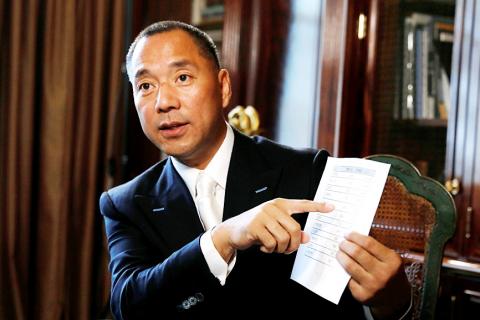Chinese tycoon Guo Wengui (郭文貴) yesterday said that China had monitored the private lives of former president Ma Ying-jeou (馬英九) and his two daughters, putting pressure on Ma to submit to Beijing’s every wish, including imprisoning former president Chen Shui-bian (陳水扁).
Guo, a controversial real-estate developer, on Monday uploaded a video to YouTube and Facebook in which he discussed a meeting he said he had in 2008 with an unnamed Chinese who was then a high-ranking officer in the Chinese People’s Liberation Army General Political Department.
Ma won his first term as president that year.

Photo: Reuters
Guo said he asked the official whether China would be able to “rein Ma in,” to which the official replied: “No doubt we can control him. He will listen to us 100 percent.”
When asked to expound on China’s “control” over Ma, Guo quoted the official as saying: “Ma will redefine the [so-called] 1992 consensus during his term and develop closer economic ties between Taiwan and China. Our economic carrots will definitely take effect.”
Ma would definitely imprison Chen on Beijing’s instruction, which was China’s move to “intimidate” the Democratic Progressive Party, Guo quoted the official as saying.
“We have monitored Ma’s private life and his two daughters for many years,” the official added. “He would not say a word. He will do whatever we want him to do.”
“His every move is under our eyes and so are his two daughters,” the official said.
When asked what Beijing would do if Ma refused to cooperate, Guo said the official told him that Ma would not refuse, as Beijing had a plan in store that would “destroy” Ma.
Guo said that in retrospect, he realized that everything the official said had played out during Ma’s time in office, citing his “audacious” policies to increase economic ties with China and his “radical” imprisonment of Chen.
“I welcome Ma to press charges against me. I would be happy to testify in a Taiwanese court of law or go to Taiwan to present the evidence,” he said.
Guo also spoke about three strategies formulated by China to rein in Taiwan and Hong Kong, which he said would inflict “more damage than a nuclear weapon.”
The first is China’s manipulation of information in Taiwanese and Hong Kong stock exchanges and politics, including distorting financial information and imprisoning Chen and former Hong Kong chief executive Donald Tsang (曾蔭權) — all of which transpired according to Beijing’s design, he said.
The second strategy involves filming businesspeople and officials gambling or accepting sexual favors and using the footage to blackmail them.
Another strategy is deceiving businesspeople into believing they are exempted from paying taxes when conducting business in China and then threatening to prosecute them over tax evasion unless they promise to carry out China’s plans to “corrupt” officials at home, Guo said.
Ma’s office spokeswoman Hsu Chiao-hsin (徐巧芯) said that people should not get worked up over unfounded claims.
“All the allegations are imagined,” she said.

NATIONAL SECURITY THREAT: An official said that Guan Guan’s comments had gone beyond the threshold of free speech, as she advocated for the destruction of the ROC China-born media influencer Guan Guan’s (關關) residency permit has been revoked for repeatedly posting pro-China content that threatens national security, the National Immigration Agency said yesterday. Guan Guan has said many controversial things in her videos posted to Douyin (抖音), including “the red flag will soon be painted all over Taiwan” and “Taiwan is an inseparable part of China,” while expressing hope for expedited “reunification.” The agency received multiple reports alleging that Guan Guan had advocated for armed reunification last year. After investigating, the agency last month issued a notice requiring her to appear and account for her actions. Guan Guan appeared as required,

A Vietnamese migrant worker yesterday won NT$12 million (US$379,627) on a Lunar New Year scratch card in Kaohsiung as part of Taiwan Lottery Co’s (台灣彩券) “NT$12 Million Grand Fortune” (1200萬大吉利) game. The man was the first top-prize winner of the new game launched on Jan. 6 to mark the Lunar New Year. Three Vietnamese migrant workers visited a Taiwan Lottery shop on Xinyue Street in Kaohsiung’s Gangshan District (崗山), a store representative said. The player bought multiple tickets and, after winning nothing, held the final lottery ticket in one hand and rubbed the store’s statue of the Maitreya Buddha’s belly with the other,

‘NATO-PLUS’: ‘Our strategic partners in the Indo-Pacific are facing increasing aggression by the Chinese Communist Party,’ US Representative Rob Wittman said The US House of Representatives on Monday released its version of the Consolidated Appropriations Act, which includes US$1.15 billion to support security cooperation with Taiwan. The omnibus act, covering US$1.2 trillion of spending, allocates US$1 billion for the Taiwan Security Cooperation Initiative, as well as US$150 million for the replacement of defense articles and reimbursement of defense services provided to Taiwan. The fund allocations were based on the US National Defense Authorization Act for fiscal 2026 that was passed by the US Congress last month and authorized up to US$1 billion to the US Defense Security Cooperation Agency in support of the

CLASSIFIED BRIEFING: The ministry said the special budget focuses on building a comprehensive defense system and strengthening the domestic defense industry The Ministry of National Defense yesterday released information on seven categories of weapons systems to be procured under a stalled NT$1.25 trillion (US$39.57 billion) special defense budget, including precision artillery, long-range missiles, air defense anti-tank missiles and more than 200,000 uncrewed aerial vehicles (UAVs). The Executive Yuan approved a draft version of the budget on Nov. 27 last year and submitted it to the legislature for review. The legislature’s Foreign Affairs and National Defense Committee yesterday invited Minister of National Defense Wellington Koo (顧立雄) to deliver a classified briefing and answer questions at a closed-door session. Koo said he hoped to provide lawmakers